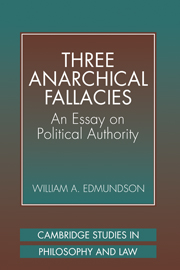Book contents
- Frontmatter
- Contents
- Acknowledgments
- Introduction
- Part One The Fallacious Argument from the Failure of Political Obligation
- Part Two The “Law Is Coercive” Fallacy
- 4 The Concept of Coercion
- 5 Political Theory without Coercion
- 6 Coercion Redivivus
- Part Three The Inner Sphere of Privacy Fallacy
- Conclusion: The State for What?
- Index
4 - The Concept of Coercion
from Part Two - The “Law Is Coercive” Fallacy
Published online by Cambridge University Press: 19 March 2010
- Frontmatter
- Contents
- Acknowledgments
- Introduction
- Part One The Fallacious Argument from the Failure of Political Obligation
- Part Two The “Law Is Coercive” Fallacy
- 4 The Concept of Coercion
- 5 Political Theory without Coercion
- 6 Coercion Redivivus
- Part Three The Inner Sphere of Privacy Fallacy
- Conclusion: The State for What?
- Index
Summary
That law is coercive is something we all more or less take for granted. It is an assumption so rooted in our ways of thinking that it is taken as a given of social reality, an uncontroversial datum. Because it is so regarded, it is infrequently stated, and when it is, it is stated without any hint of possible complications or any need of qualifications. I will call this the “pre-reflective view,” and I want to examine it with the care it deserves.
To call the view that law is coercive a pre-reflective view is not to say that it is not held by thoughtful people. On the contrary, the prereflective view is a pervasive assumption of modern legal and political theory. It is an assumption made by many Marxists, as well as those in the political center and on the right. It is not an idle assumption: What we regard as coercive we regard as prima facie illegitimate and we hold it to an accounting; what is not coercive, in contrast, is presumed to be in order. To be able to cast the law, or the free market, as a coercive force is to be able to cast upon its defenders a burden of persuasion, which, even if carried, leaves what has to be defended under a cloud. Where, as in morality and politics, so much is uncertain, claiming the benefit of a presumption may be the decisive rhetorical advantage – the beneficiary of the presumption winning, as it were, by default.
- Type
- Chapter
- Information
- Three Anarchical FallaciesAn Essay on Political Authority, pp. 73 - 83Publisher: Cambridge University PressPrint publication year: 1998

